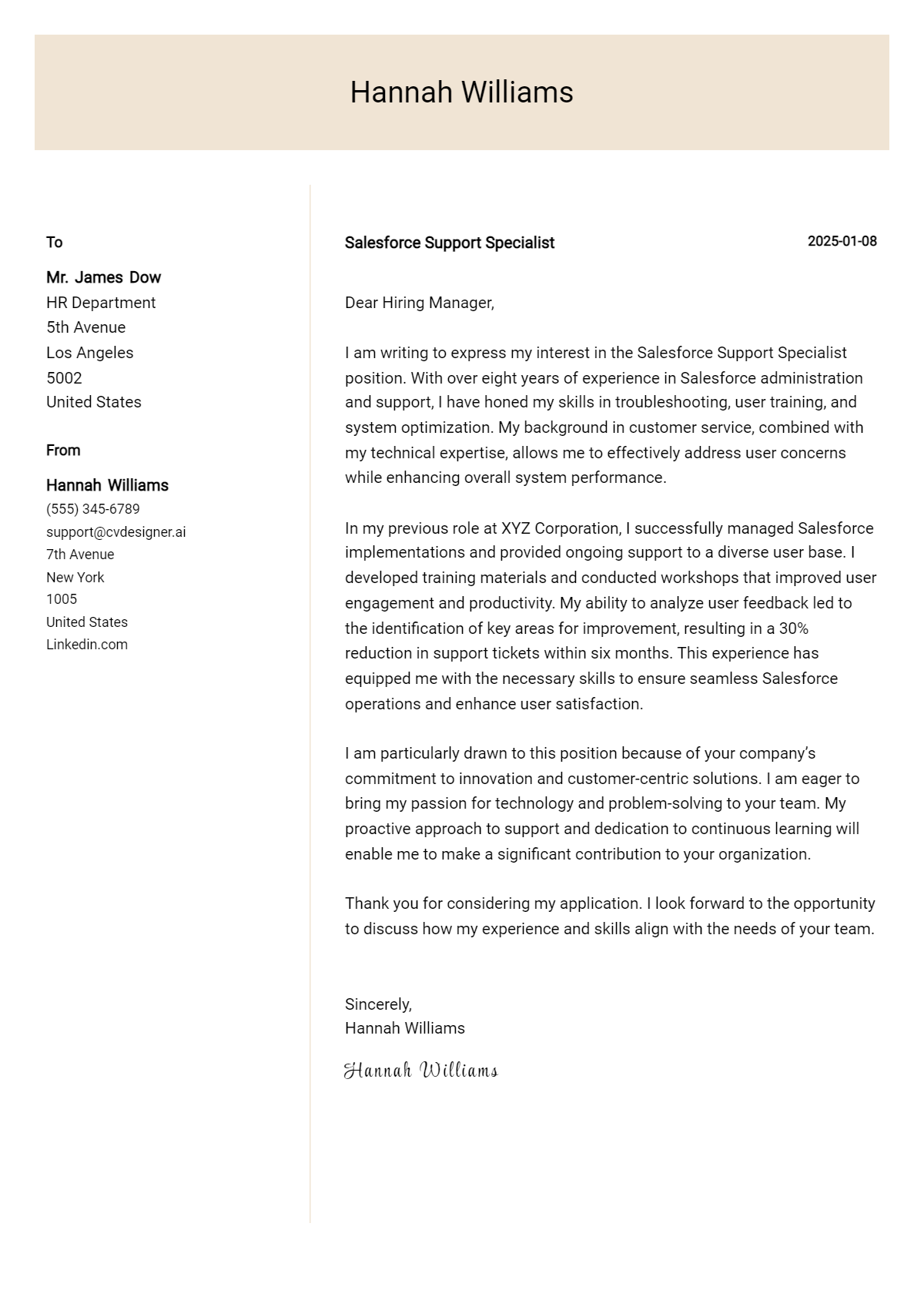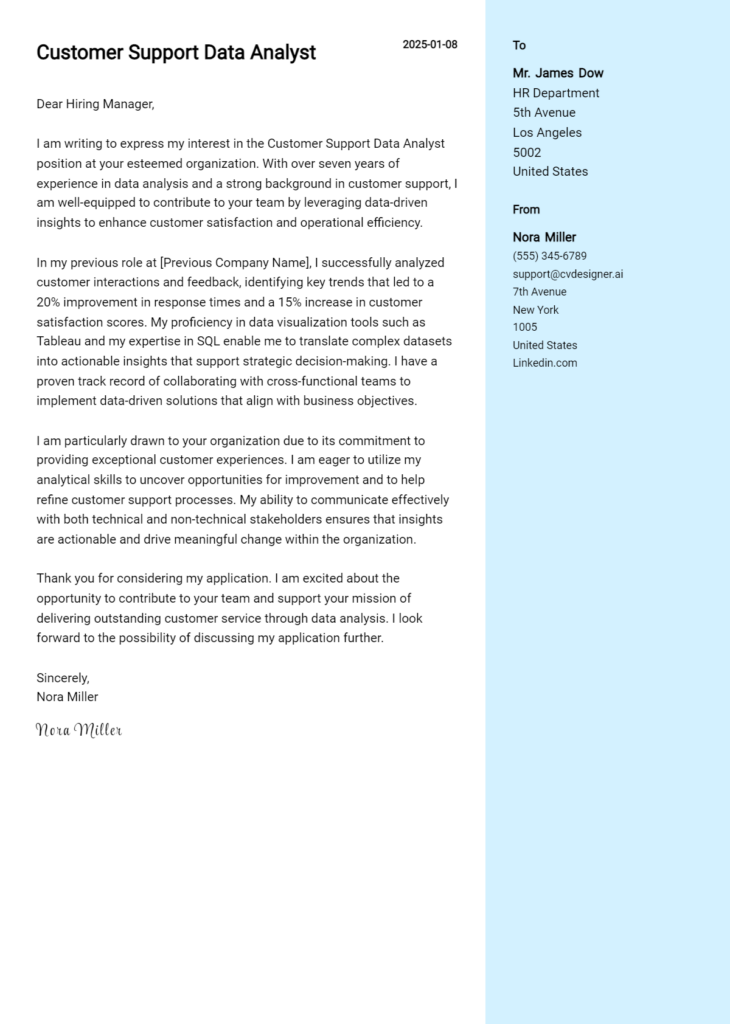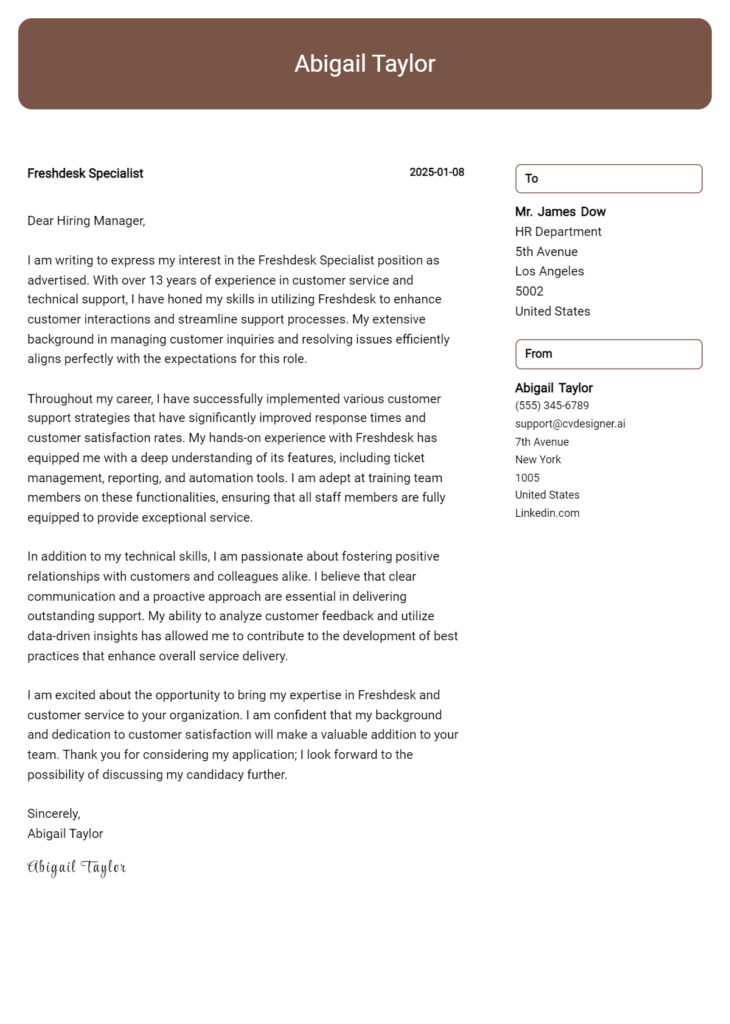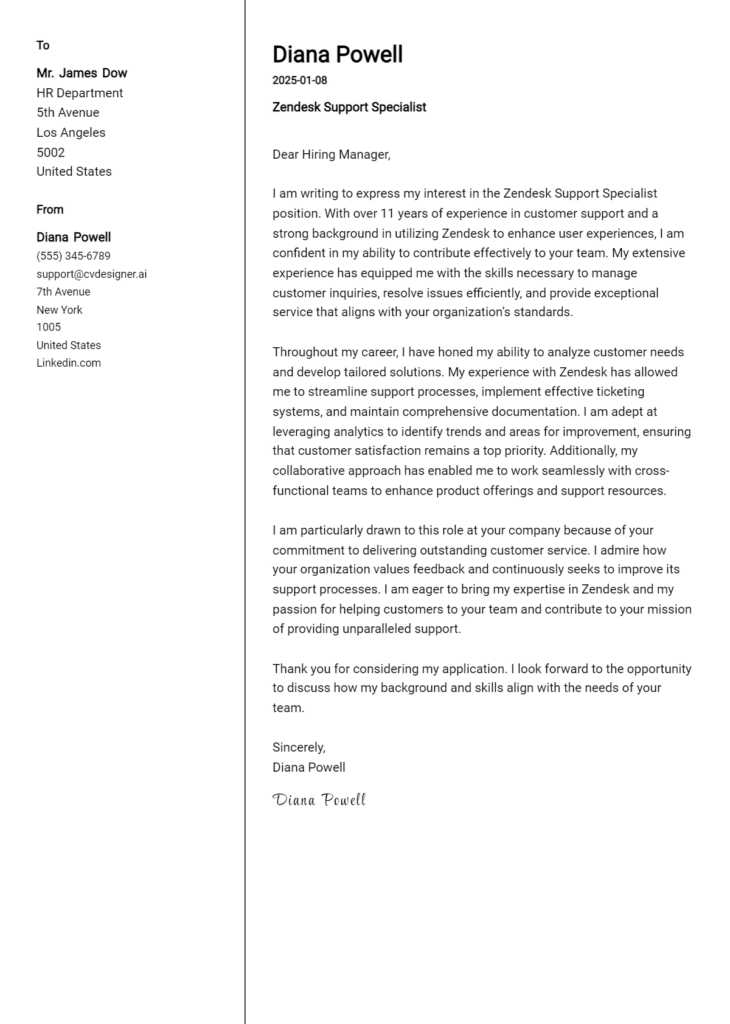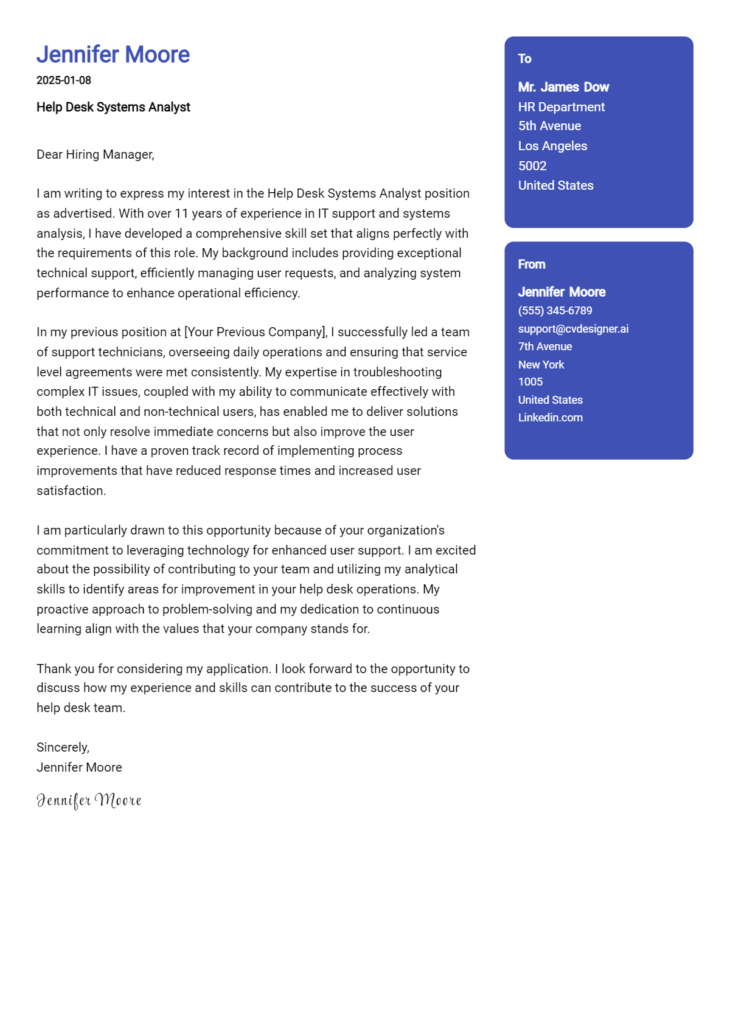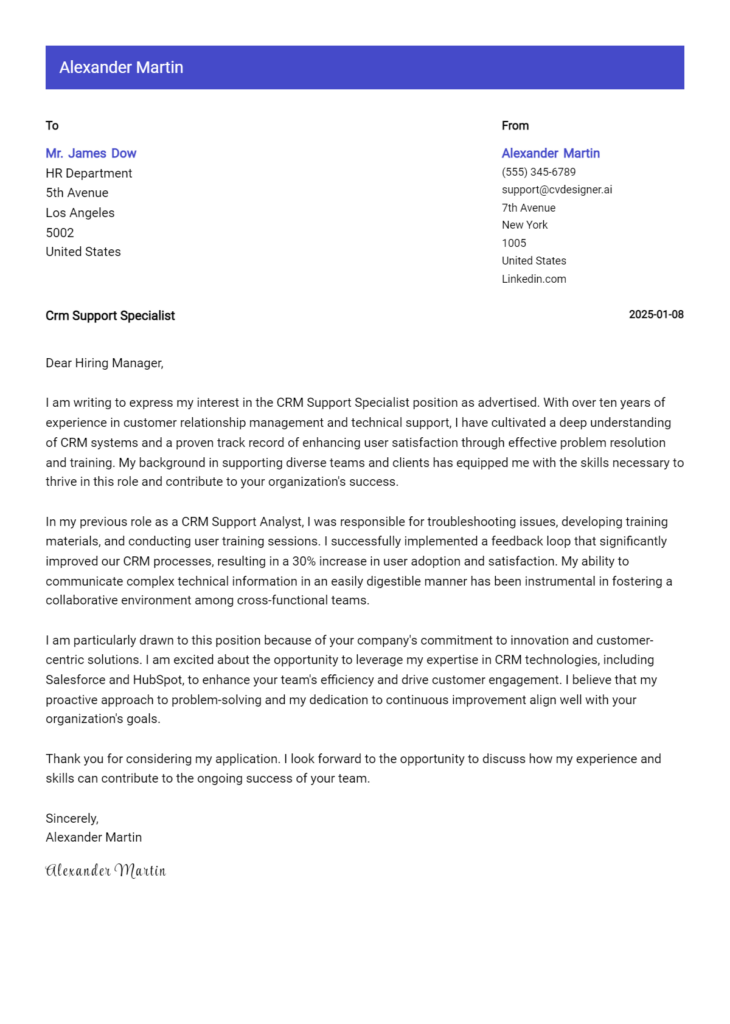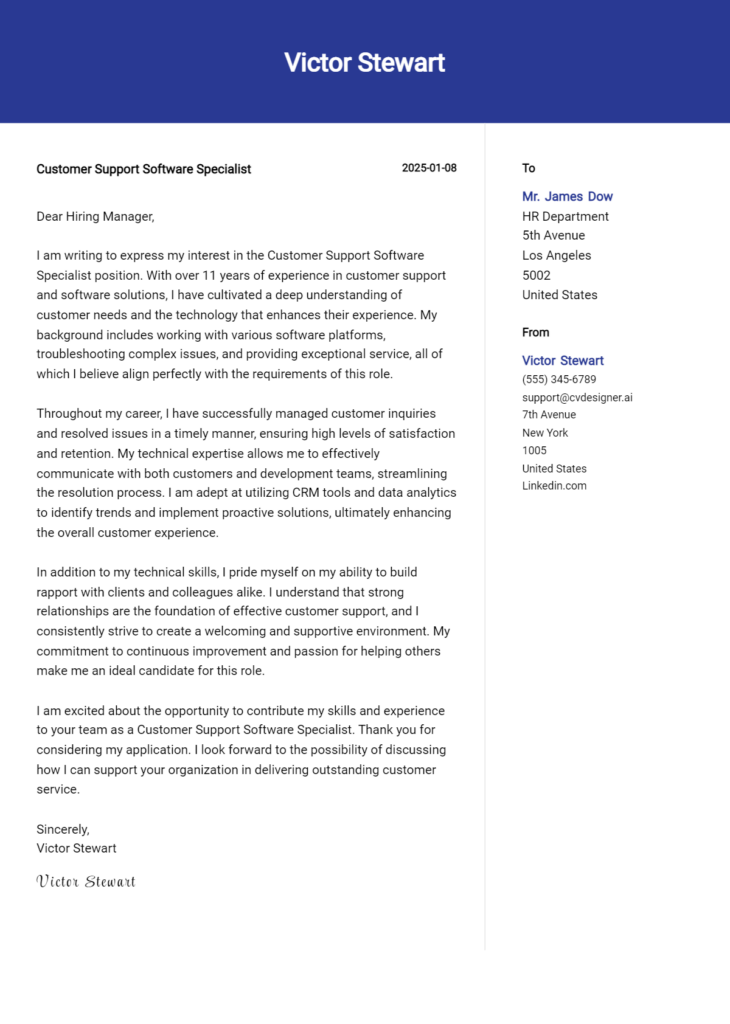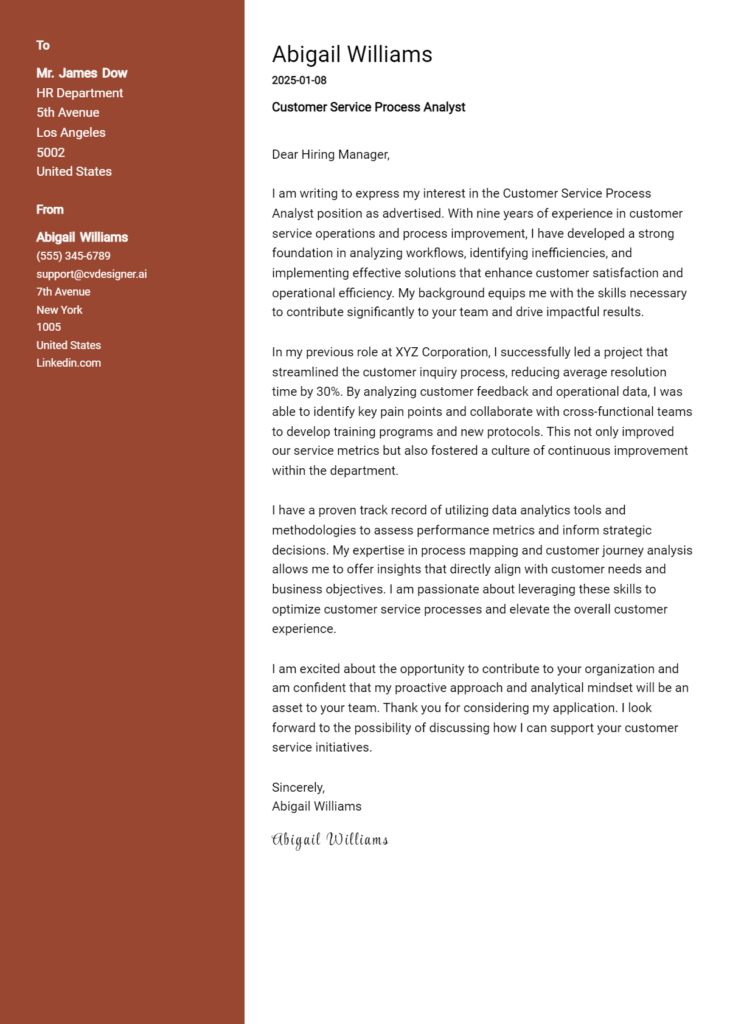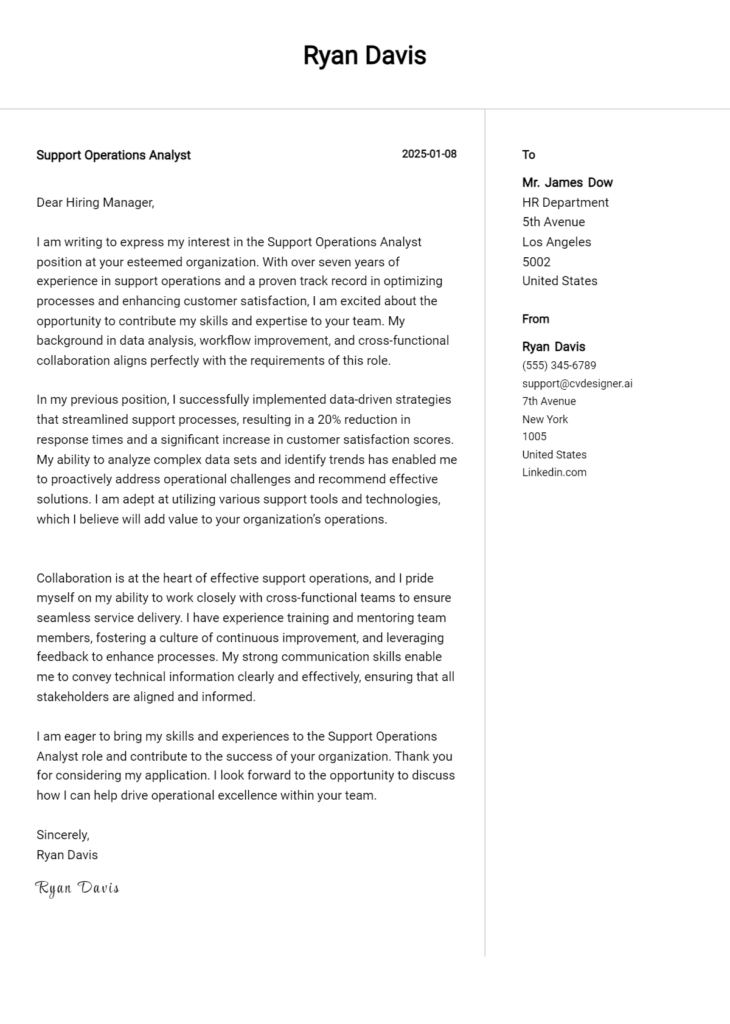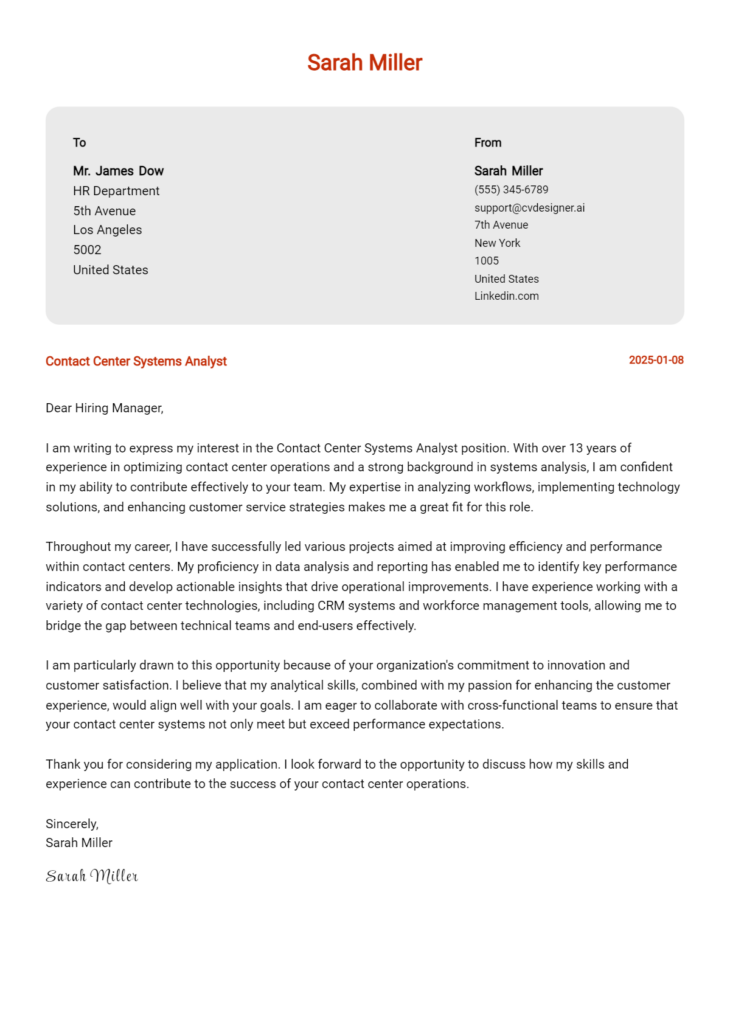Salesforce Support Specialist Cover Letter Examples
Explore additional Salesforce Support Specialist cover letter samples and guides and see what works for your level of experience or role.
How to Format a Salesforce Support Specialist Cover Letter?
Crafting a compelling cover letter as a Salesforce Support Specialist is essential, as it serves as your first impression to potential employers. The way you present your skills and experiences can significantly influence the hiring manager’s perception of your technical proficiency and customer service capabilities. A well-structured cover letter not only highlights your qualifications but also demonstrates your attention to detail and your understanding of Salesforce’s importance in driving business success.
In this guide, we will outline how to format your cover letter effectively, providing insights and Salesforce-specific examples to help you create an impressive document.
We will focus on the critical components of a professional cover letter, including:
- Cover Letter Header
- Cover Letter Greeting
- Cover Letter Introduction
- Cover Letter Body
- Cover Letter Closing
Each section is vital in showcasing your qualifications and professionalism. Let’s explore each part to ensure your Salesforce Support Specialist cover letter stands out in a competitive job market.
Importance of the Cover Letter Header for a Salesforce Support Specialist
The cover letter header is a crucial element for any job application, including for a Salesforce Support Specialist. It sets the tone for your professionalism and attention to detail right from the start. A well-structured header should include your contact information, the date, and the recipient's details. Clarity in this section ensures that the hiring manager can easily reach you and understand the context of your application. A strong header reflects your organizational skills, which are essential in a support role, while a weak header can detract from an otherwise strong application.
Strong Example
John Doe 1234 Elm Street San Francisco, CA 94101 (555) 123-4567 john.doe@email.com October 1, 2023 Jane Smith Hiring Manager ABC Company 5678 Oak Avenue San Francisco, CA 94102
Weak Example
john doe october 1, 2023 abc company
The Importance of the Cover Letter Greeting
The greeting of a cover letter serves as the initial point of contact between the applicant and the hiring manager, setting the tone for the entire letter. By addressing the hiring manager directly, candidates can demonstrate professionalism and a personalized touch, showcasing their interest in the specific position. A well-crafted greeting helps to establish a connection and may make the applicant stand out among others. To avoid generic greetings like "To Whom It May Concern," it’s advisable to conduct some research to find the recipient's name. This small effort can make a significant difference in how the letter is perceived.
Strong Greeting Example
Dear [Hiring Manager's Name],
Weak Greeting Example
To Whom It May Concern,
The Importance of a Strong Cover Letter Introduction for a Salesforce Support Specialist
A well-crafted cover letter introduction is crucial for a Salesforce Support Specialist as it serves as the first impression to the hiring manager. This introduction should not only capture their attention but also convey genuine interest in the role. Additionally, it should briefly highlight key skills or achievements that align with the job description, establishing the candidate’s suitability for the position. A strong introduction sets the tone for the rest of the cover letter and encourages the hiring manager to read on, whereas a weak introduction can lead to a missed opportunity.
Strong Example:
Dear [Hiring Manager's Name], I am excited to apply for the Salesforce Support Specialist position at [Company Name]. With over three years of hands-on experience in Salesforce administration and a proven track record of enhancing user satisfaction through effective troubleshooting and support, I am confident in my ability to contribute to your team. My commitment to delivering exceptional customer service and my proficiency in Salesforce's various functionalities make me a perfect fit for this role.
Weak Example:
To Whom It May Concern, I am applying for the Salesforce Support Specialist position. I have some experience with Salesforce and think I would be okay at the job. I hope you consider my application.
Purpose of the Cover Letter Body for a Salesforce Support Specialist
The body of a cover letter for a Salesforce Support Specialist serves to highlight the candidate's relevant skills, experiences, and the unique value they can bring to the organization. This section provides an opportunity to detail specific projects or accomplishments that demonstrate proficiency in Salesforce, problem-solving abilities, and a commitment to customer service. By articulating past experiences, such as successful implementations or enhancements of Salesforce features, the candidate can effectively convey their capability to support the company's objectives and improve user experience.
Strong Example
In my previous role at XYZ Corporation, I successfully managed a project to streamline our Salesforce customer relationship management system, resulting in a 25% reduction in response time to customer inquiries. By collaborating with cross-functional teams, I implemented a series of automation processes that not only improved efficiency but also enhanced customer satisfaction scores by 15%. My ability to analyze user feedback and translate it into actionable solutions has been instrumental in fostering a user-friendly environment, which I am eager to replicate at your organization.
Weak Example
I have worked with Salesforce for a while and have some experience in customer support. I think I can help your company. I am good at using technology and have done some projects. I believe I would be a good fit for the job.
Importance of the Cover Letter Closing for a Salesforce Support Specialist
The closing paragraph of a cover letter is crucial as it encapsulates your qualifications, reinforces your enthusiasm for the position, and invites the hiring manager to take the next steps. For a Salesforce Support Specialist, this means highlighting relevant skills such as problem-solving, customer service, and technical expertise. A strong closing will leave a positive impression and encourage the reviewer to look at your resume and consider you for an interview, while a weak closing may miss the mark and fail to convey your genuine interest in the role.
Strong Example
Thank you for considering my application for the Salesforce Support Specialist position. With my extensive experience in Salesforce administration and customer service, I am excited about the opportunity to contribute to your team. I look forward to discussing how my skills can help improve user satisfaction and system efficiency at [Company Name]. Please feel free to review my resume for more details, and I hope to hear from you soon to schedule an interview.
Weak Example
I think I would be okay for the Salesforce Support Specialist job. My resume is attached, and I hope you look at it. Thanks for your time.
These tips will assist candidates in crafting an effective cover letter for a Salesforce Support Specialist position. A well-written cover letter not only highlights your technical skills and problem-solving abilities but also underscores your understanding of the Software Development Life Cycle (SDLC), your ability to work in a team, and your enthusiasm for continuous learning. By focusing on these key areas, you can create a compelling narrative that captures the attention of hiring managers.
Cover Letter Writing Tips for Salesforce Support Specialist
Showcase Your Technical Skills: Begin by highlighting your proficiency with Salesforce and any relevant certifications you possess. Mention specific tools you’re familiar with, such as Apex, Visualforce, or Salesforce Lightning. This will demonstrate your technical capability right from the start.
Emphasize Problem-Solving Abilities: Provide examples of how you've successfully resolved issues in previous roles. Use the STAR method (Situation, Task, Action, Result) to describe a challenging scenario and the steps you took to overcome it. This approach not only illustrates your problem-solving skills but also showcases your ability to handle pressure effectively.
Demonstrate Knowledge of SDLC: Discuss your understanding of the Software Development Life Cycle and how it applies to Salesforce projects. Mention any experience you have with different SDLC models, such as Agile or Waterfall, and how they have influenced your work as a support specialist. This knowledge will show your familiarity with the processes that drive successful software implementation.
Highlight Teamwork and Collaboration: Salesforce Support Specialists often work in team settings. Share experiences where you collaborated with cross-functional teams to achieve a common goal. Whether it was through training sessions, project launches, or troubleshooting, emphasize how your teamwork contributed to the success of the project.
Express a Passion for Continuous Learning: The tech landscape is always evolving, especially in platforms like Salesforce. Convey your commitment to professional development by mentioning any recent training, courses, or certifications you’ve pursued. This shows that you are proactive and dedicated to staying current in your field, which is a desirable trait for many employers.
By following these tips and utilizing resources like cover letter templates and a cover letter builder, you can create a cover letter that stands out and effectively communicates your qualifications for the Salesforce Support Specialist role.
Common Mistakes to Avoid in a Salesforce Support Specialist Cover Letter
Avoiding common mistakes in your cover letter is crucial for standing out as a candidate for the Salesforce Support Specialist role. Many applicants fall into traps that can diminish their chances of making a positive impression. Here are some common mistakes and tips to avoid them:
Generic Language: Using a one-size-fits-all cover letter can make you seem uninterested. Tailor your letter to the specific job and company by mentioning relevant experiences and skills.
Lack of Specific Examples: Failing to provide concrete examples of your experience with Salesforce can weaken your application. Highlight specific achievements or projects that showcase your skills in Salesforce support.
Ignoring the Job Description: Not aligning your cover letter with the job description can lead to missed opportunities. Carefully read the listing and incorporate keywords and required skills to demonstrate your fit.
Poor Formatting: A cluttered or unprofessional format can distract from your message. Use a clean and organized cover letter format to enhance readability and professionalism.
Neglecting to Proofread: Spelling and grammatical errors can undermine your credibility. Always proofread your cover letter multiple times and consider using tools or a second pair of eyes to catch mistakes.
Focusing Too Much on Salary: Discussing salary expectations in the cover letter can come off as presumptuous. Instead, focus on your qualifications and what you can bring to the company.
Being Overly Formal or Casual: Striking the right tone is essential. Aim for a professional yet approachable tone that reflects your personality while respecting the company's culture.
For more insights, check out these cover letter examples to inspire your writing and ensure you craft a compelling letter that showcases your qualifications effectively.
Cover Letter FAQs for Salesforce Support Specialist
What should I include in my cover letter for a Salesforce Support Specialist position?
Your cover letter should highlight relevant skills and experiences that align with the Salesforce Support Specialist role. Start with a strong opening that introduces yourself and expresses your enthusiasm for the position. Include specific examples of your experience with Salesforce, such as handling user inquiries, troubleshooting issues, or implementing solutions. Mention any certifications or training related to Salesforce, as they can set you apart. Additionally, emphasize your communication skills and ability to work in a team, as these are crucial for providing effective support. Finally, conclude with a call to action, inviting the hiring manager to discuss your qualifications further.
How can I demonstrate my Salesforce knowledge in my cover letter?
To demonstrate your Salesforce knowledge, be specific about the features and tools you are familiar with. Mention any hands-on experience you have with Salesforce modules such as Sales Cloud, Service Cloud, or Marketing Cloud. Highlight any projects where you successfully utilized Salesforce to solve problems or improve processes. If you have completed Salesforce certifications, include them in your cover letter to showcase your commitment to the platform. Consider explaining how your knowledge of Salesforce has enabled you to provide exceptional customer support or improved user experience in previous roles.
Should I tailor my cover letter for each Salesforce Support Specialist application?
Yes, tailoring your cover letter for each application is highly recommended. Each company may have different expectations and values, so addressing these in your cover letter can make a significant impact. Analyze the job description and identify key skills and experiences the employer is looking for. Adjust your cover letter to emphasize how your background aligns with these requirements. For example, if a job emphasizes the importance of problem-solving skills, include specific examples from your past roles where you successfully resolved customer issues. This customization shows your genuine interest in the position and helps you stand out among other candidates.
How long should my cover letter be for a Salesforce Support Specialist role?
Your cover letter should ideally be one page long, consisting of three to four paragraphs. Aim for a concise yet informative approach, keeping it to around 250-300 words. Start with an engaging introduction, followed by a couple of paragraphs that elaborate on your relevant experience and skills. Use bullet points if necessary to highlight specific achievements or qualifications, but keep it professional and easy to read. Finally, wrap up with a strong closing statement that reiterates your enthusiasm for the position and invites the employer to contact you for further discussion.
Build your Cover Letter in minutes
Use an AI-powered cover letter builder and have your letter done in 5 minutes. Just select your template and our software will guide you through the process.

